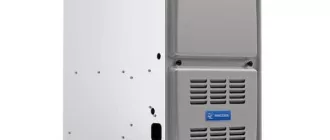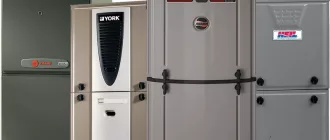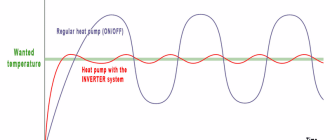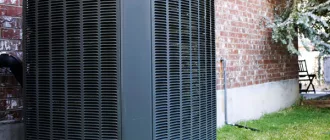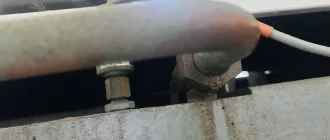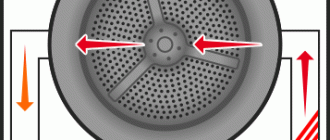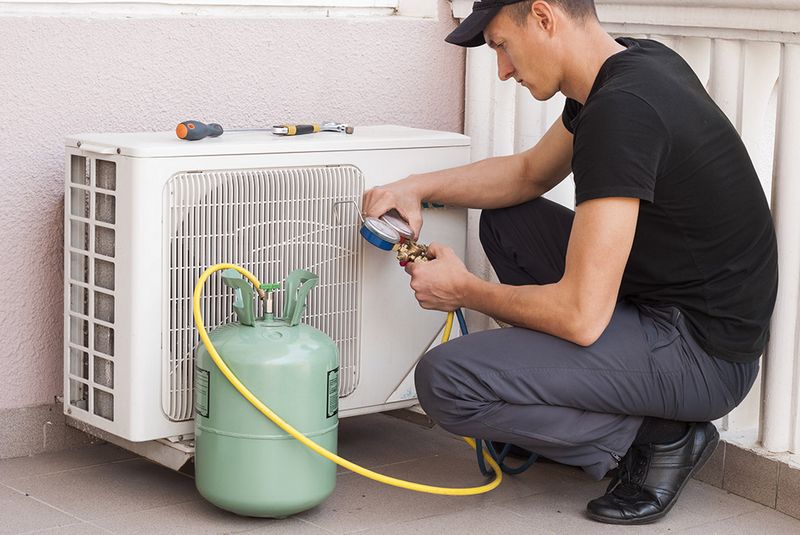
The Importance of Ensuring Your Air Conditioner or Heat Pump is Level
When it comes to keeping your home cool and comfortable during the hot summer months or warm and cozy during the chilly winter season, ensuring that your air conditioner or heat pump is level is of utmost importance. This often overlooked aspect of HVAC maintenance can have a significant impact on the performance and lifespan of your cooling and heating system.
Why is it important to have a level air conditioner or heat pump? A level unit helps evenly distribute the refrigerant or heat transfer fluid within the system, ensuring optimal efficiency and performance. When the unit is not level, it can lead to several problems, such as improper lubrication of the compressor, reduced airflow, increased energy consumption, and even premature system failure.
Proper installation is crucial in ensuring that your air conditioner or heat pump is level. It is recommended to hire a professional HVAC technician who has the expertise and experience to ensure a level installation. This includes checking the levelness of the concrete pad or mounting surface, adjusting the leveling legs or base, and confirming that the unit is securely fastened.
In conclusion, the importance of ensuring your air conditioner or heat pump is level cannot be overstated. By taking the time to properly install and level your unit, you can enjoy optimal performance, energy efficiency, and longevity of your cooling and heating system. Remember to consult with a professional HVAC technician for expert tips and advice on maintaining a level air conditioner or heat pump.
Why Leveling Your Air Conditioner or Heat Pump is Important
Ensuring that your air conditioner or heat pump is level is of vital importance for its proper functioning. When your unit is not level, it can lead to a number of problems that can affect its performance and lifespan.
One of the main reasons why leveling your air conditioner or heat pump is important is that it allows for the proper draining of condensation. When the unit is level, the condensation can flow out of the unit and away from your home. If the unit is not level, the condensation may build up and cause damage to your unit and your property.
Another reason why leveling is important is to ensure that your unit is functioning efficiently. When the unit is not level, it can put unnecessary strain on its components, such as the compressor. This can lead to increased energy consumption and higher utility bills.
Additionally, leveling your air conditioner or heat pump helps to distribute the cool or warm air evenly throughout your home. When the unit is not level, it may result in uneven airflow, with some rooms being cooler or warmer than others. Proper leveling can help to maintain a comfortable and consistent temperature in every room of your home.
Finally, leveling your unit is important for its longevity. When the unit is not level, it can cause the internal components to work harder than necessary, leading to increased wear and tear. By ensuring that your air conditioner or heat pump is level, you can extend its lifespan and save money on costly repairs or replacements.
In conclusion, ensuring that your air conditioner or heat pump is level is crucial for its proper functioning, efficient operation, and longevity. By taking the time to level your unit, you can avoid unnecessary problems and enjoy a comfortable and well-functioning HVAC system.
The Effects of an Unlevel Air Conditioner or Heat Pump
Ensuring that your air conditioner or heat pump is level is of utmost importance for optimal functioning. An unlevel unit can cause a variety of issues that can negatively impact the performance and efficiency of your system.
When your air conditioner or heat pump is not level, it can lead to improper drainage. This can result in water pooling around the unit, potentially causing damage to the system and surrounding areas. Additionally, standing water can provide a breeding ground for bacteria and mold, which can affect the air quality in your home.
An unlevel system can also lead to uneven cooling or heating. The refrigerant inside the unit may not distribute evenly, causing certain areas of your home to be hotter or colder than others. This can result in discomfort and increased energy consumption as you try to compensate for the temperature fluctuations.
Furthermore, an unlevel air conditioner or heat pump can put unnecessary strain on the components of the system. This can lead to premature wear and tear, potentially shortening the lifespan of the unit and increasing the likelihood of breakdowns. Regular maintenance and leveling can help prevent these issues and ensure the longevity and efficiency of your HVAC system.
To avoid these negative effects, it is crucial to regularly check and level your air conditioner or heat pump. You can use a simple bubble level to ensure that the unit is perfectly horizontal. If you notice any unevenness, it is recommended to consult a professional HVAC technician to properly level the system.
In conclusion, the importance of ensuring that your air conditioner or heat pump is level cannot be overstated. The effects of an unlevel unit can include improper drainage, uneven cooling or heating, increased strain on components, and potential damage to the system and surrounding areas. By prioritizing regular maintenance and leveling, you can avoid these issues and keep your HVAC system running smoothly and efficiently.
Increased Energy Efficiency with a Level Unit
Ensuring your air conditioner or heat pump is level is of utmost importance for maximizing energy efficiency. When your unit is not level, it can cause a number of issues that can negatively impact its performance and cost you more money in energy bills.
A level unit allows for optimal airflow and proper operation. When your air conditioner or heat pump is not level, it can cause uneven cooling or heating throughout your space. This means that some areas may be too hot or too cold, leading to discomfort and the need to adjust the thermostat more frequently.
In addition, a level unit ensures that your air conditioner or heat pump is functioning at its full capacity. When your unit is tilted, it can put unnecessary strain on its components, which can lead to increased wear and tear and potential breakdowns. This not only requires costly repairs but can also shorten the lifespan of your unit.
Furthermore, a level unit helps to prevent water leakage. This is especially important for air conditioners, as they produce condensation when running. If your unit is not level, the condensation may not drain properly and could potentially cause water damage to your property.
In terms of energy efficiency, a level unit ensures that your system is running as efficiently as possible. When your unit is not level, it has to work harder to achieve the desired temperature, which requires more energy. This can significantly increase your energy bills over time.
Therefore, it is important to regularly check and ensure that your air conditioner or heat pump is level. If you notice that your unit is not level, you can adjust it yourself or hire a professional to do so. By keeping your unit level, you can improve energy efficiency, reduce the need for repairs, and prolong the lifespan of your air conditioner or heat pump.
The Impact of an Unlevel Unit on Air Flow
Ensuring that your air conditioner or heat pump is level is of utmost importance when it comes to maintaining proper air flow. When the unit is not level, it can cause several issues that can negatively affect the performance of your HVAC system.
- 1. Uneven cooling or heating: When your unit is not level, it can hinder the proper distribution of air throughout your home. This means that certain areas may feel hotter or cooler than others, leading to an uncomfortable indoor environment.
- 2. Reduced efficiency: An unlevel unit can also result in reduced efficiency of your air conditioner or heat pump. When the unit is not balanced, it may have to work harder to operate, leading to increased energy consumption and higher utility bills.
- 3. Increased strain on components: A unit that is not level can put excessive stress on the various components of your HVAC system. This can lead to premature wear and tear, and potentially costly repairs or replacements.
- 4. Drainage issues: An unlevel unit can cause problems with drainage. If the unit is not properly positioned, condensation may not be able to drain effectively, leading to water pooling and potential water damage.
- 5. Noise and vibration: A unit that is not level can produce excessive noise and vibration. This can be both annoying and disruptive, affecting your overall comfort and peace of mind.
Overall, the importance of ensuring that your air conditioner or heat pump is level cannot be overstated. By maintaining a level unit, you can ensure proper air flow, improve energy efficiency, prolong the lifespan of your HVAC system, and enjoy a more comfortable indoor environment.
How to Determine if Your Unit is Level
Ensuring that your air conditioner or heat pump is level is essential for optimal performance. A level unit helps distribute cool or warm air evenly throughout your space, preventing uneven cooling or heating. Here are some simple steps to determine if your unit is level.
1. Visual Inspection: Start by visually examining your unit. Look for any signs of tilt or unevenness. Check if the unit is leaning to one side or if it appears to be off-balance. A level unit should sit squarely on the ground with no noticeable tilt.
2. Use a Leveling Tool: If a visual inspection doesn’t provide a conclusive answer, use a leveling tool. Place the tool on top of your unit and check if the bubble is centered within the level. If the bubble is off-center, it indicates that your unit is not level.
3. Check for Water Accumulation: If your unit is not level, it may cause water to accumulate in certain areas. Look for any signs of water pooling around the unit. Excessive water accumulation can lead to damage and reduce the efficiency of your system.
4. Consult a Professional: If you’re unsure about determining the level of your unit, it’s best to consult a professional HVAC technician. They have the expertise and tools to assess and level your unit accurately. It’s important not to attempt to level the unit on your own if you’re not confident in your abilities.
By ensuring that your air conditioner or heat pump is level, you can avoid potential problems and ensure that your unit operates efficiently. Regular maintenance, including leveling, is essential for prolonging the lifespan of your system and maintaining optimal comfort in your space.
Common Causes of an Unlevel Air Conditioner or Heat Pump
Ensuring that your air conditioner or heat pump is level is of utmost importance. An unlevel air conditioner or heat pump can lead to a variety of problems and decrease the efficiency of your system. Here are some common causes of an unlevel air conditioner or heat pump:
- Improper installation: If your air conditioner or heat pump was not installed correctly, it may not be level. This could be due to a lack of proper support or uneven ground.
- Settling of the foundation: Over time, the ground around your air conditioner or heat pump may settle, causing it to become unlevel. This can happen due to changes in soil composition or erosion.
- Uneven ground: If your air conditioner or heat pump is located on uneven ground, it may become unlevel. This can happen if the ground is not properly prepared before installation or if there are changes in the ground over time.
- Heavy rain or flooding: Excessive rain or flooding can cause the ground to shift and lead to an unlevel air conditioner or heat pump.
- General wear and tear: Over time, the components of your air conditioner or heat pump may wear out or become damaged, causing it to become unlevel.
No matter the cause, it is important to address an unlevel air conditioner or heat pump as soon as possible. An unlevel unit can cause the refrigerant lines to become kinked or damaged, resulting in decreased efficiency and increased energy consumption. Additionally, an unlevel unit can place undue stress on the components of your system, leading to premature wear and shortened lifespan.
To ensure that your air conditioner or heat pump remains level, it is recommended to have your system regularly inspected and serviced by a professional HVAC technician. They can identify and address any issues that may be causing the unit to become unlevel, helping to maintain the efficiency and longevity of your system.
The DIY Method for Leveling Your Unit
Ensuring that your air conditioner or heat pump is level is of utmost importance for its proper functioning. If the unit is not level, it can lead to several problems, including decreased airflow, decreased energy efficiency, and potential damage to the internal components. So, it is crucial to regularly check and level your unit.
The DIY method for leveling your unit is relatively simple and requires just a few tools. Here are the steps to follow:
- Start by turning off the power to your air conditioner or heat pump. This is essential for your safety.
- Next, identify the low side of the unit by referring to the manufacturer’s instructions or looking for any leveling feet or adjustment screws.
- Using a level, place it on the low side of the unit and check for any discrepancies. If the unit is not level, continue to the next step.
- Locate the leveling feet or adjustment screws on the low side of the unit. Adjust them as needed to level the unit. You can use a wrench or screwdriver to make the necessary adjustments.
- Once you have adjusted the unit, place the level on it again to ensure that it is now level. Make any additional adjustments if required.
- Finally, turn on the power to your air conditioner or heat pump and observe its operation. If it is running smoothly and quietly, you have successfully leveled your unit.
By following this DIY method for leveling your unit, you can ensure optimal performance and longevity of your air conditioner or heat pump. However, if you are unsure or uncomfortable performing this task yourself, it is recommended to seek professional assistance.
When to Call in a Professional to Level Your Unit
Ensuring that your air conditioner or heat pump is level is of utmost importance. A level unit helps to ensure proper functioning and efficiency of the system, as well as prevent any potential damage. While you may be able to level your unit yourself, there are certain circumstances where it is recommended to call in a professional.
If you are unsure about how to properly level your unit or if you lack the necessary tools and equipment, it is best to leave the job to an experienced professional. They have the expertise and knowledge to ensure that the unit is properly leveled and will not tip or wobble, which can lead to system malfunctions.
Additionally, if your unit is located in a difficult or unsafe area, it is important to call in a professional. They will have the necessary training and equipment to safely access and level the unit without causing any damage or injury. This is particularly important if your unit is located on a rooftop or in a tight space.
Furthermore, if you notice any signs of uneven cooling or heating in your home, it is advisable to call in a professional to level your unit. Uneven temperature distribution can be a sign that your unit is not level and may require adjustment. A professional technician will be able to assess the situation and make the necessary adjustments to ensure proper airflow and temperature regulation.
In conclusion, while you may be able to level your air conditioner or heat pump yourself in some cases, it is important to know when to call in a professional. If you are unsure about the process, lack the necessary tools, have a difficult or unsafe location, or notice any signs of uneven cooling or heating, it is best to leave the job to an experienced technician. They will ensure that your unit is properly leveled, promoting optimal performance and preventing any potential damage or malfunctions.
The Potential Damage of Ignoring an Unlevel Unit
Ensuring that your air conditioner or heat pump is level is of paramount importance for maintaining its efficiency and preventing potential damage. An unlevel unit can cause a range of problems, including:
| Poor Performance | An unlevel unit can greatly reduce the efficiency of your air conditioner or heat pump. When the unit is not level, it may not operate at its optimal capacity, leading to inadequate cooling or heating. |
| Compressor Strain | If the unit is unlevel, the compressor may have to work harder to pump refrigerant through the system. This added strain can lead to premature wear and tear, resulting in costly repairs or even the need for a replacement. |
| Water Leakage | An unlevel unit can cause condensation to accumulate in areas where it shouldn’t, leading to water leakage. This can damage the unit itself, as well as any surrounding structures or flooring. |
| Uneven Cooling or Heating | When the unit is not level, it may distribute cool or warm air unevenly throughout your living or working space. This can result in hot or cold spots, making it uncomfortable to be indoors and potentially increasing energy consumption. |
| Vibration and Noise | An unlevel unit can cause excessive vibration and noise during operation. This can be not only annoying but also a sign of potential damage. If left unaddressed, it can lead to more severe issues and even system failure. |
To avoid these potential problems, it is essential to regularly check and ensure that your air conditioner or heat pump is level. If you notice any signs of an unlevel unit, it is recommended to consult a professional HVAC technician to level the unit properly and prevent further damage.
How to Check and Adjust the Level of Your Unit
Ensuring that your air conditioner or heat pump is level is crucial for its proper functioning and longevity. An unlevel unit can cause a variety of issues, such as reduced cooling or heating capacity, increased energy consumption, and potential damage to the unit.
Here are some steps you can take to check and adjust the level of your unit:
- Start by turning off your air conditioner or heat pump and disconnecting the power supply.
- Using a level tool, place it on top of the unit’s exterior cabinet. Check both the front-to-back and left-to-right levels. If the bubble on the level is not centered, the unit is not level.
- If the unit is not level, use a wrench or pliers to adjust the leveling feet or pads. In most cases, the feet can be twisted or adjusted to raise or lower the unit to achieve a level position.
- Once you have adjusted the leveling feet, recheck the levels with the level tool. Repeat the adjustment process if necessary until the bubble on the level is centered.
- After ensuring the unit is level, reconnect the power supply and turn on your air conditioner or heat pump. Monitor the unit for any unusual vibrations or noises, which may indicate further leveling adjustments are needed.
Regularly checking and adjusting the level of your air conditioner or heat pump is a simple yet important maintenance task to ensure optimal performance and prevent potential issues. Following these steps will help you keep your unit running smoothly and efficiently, saving you money on energy costs and extending its lifespan.
Tools Needed for Leveling Your Air Conditioner or Heat Pump
Ensuring that your air conditioner or heat pump is level is crucial for its proper operation and longevity. Here are the tools you will need to level your unit:
- A measuring tool, such as a level or a laser level, to determine if your unit is currently level
- Shims, which are small pieces of material used to balance and level the unit
- A wrench or pliers to adjust the leveling feet or bolts on the unit
- A screwdriver to remove any screws that may be securing the unit
- A spirit level to ensure accuracy during the leveling process
- A pry bar or crowbar to lift the unit if necessary
- Gloves to protect your hands during the leveling process
Having these tools on hand will make leveling your air conditioner or heat pump a much easier task. It’s important to regularly check and level your unit to avoid any potential issues and to ensure optimal performance.
Tips for Properly Leveling Your Unit
Ensuring that your air conditioner or heat pump is level is of utmost importance when it comes to proper functioning and efficiency. Here are some expert tips for leveling your unit:
| 1. Location: | Choose a location for your unit that is level and stable. Avoid areas that are sloped or prone to flooding. A level surface is crucial for proper operation. |
| 2. Use a level: | Before installing your unit, use a level to ensure it is perfectly level in both directions. This will prevent any potential issues with the unit’s components and keep it operating smoothly. |
| 3. Adjust the feet: | If your unit has adjustable feet, use them to fine-tune the level. Make sure all feet are firmly in contact with the ground and adjust as necessary to achieve perfect balance. |
| 4. Check for vibrations: | Once your unit is leveled, turn it on and check for any excessive vibrations. If you feel excessive shaking or vibrating, it could indicate an issue with the unit’s installation or balance. Consult a professional for further assistance. |
| 5. Regular maintenance: | Make sure to regularly check and maintain the level of your air conditioner or heat pump. Over time, the unit may shift or settle, causing it to become unlevel. Regular maintenance will ensure efficient and trouble-free operation. |
By following these tips and properly leveling your unit, you will not only ensure its longevity but also maximize its performance and energy efficiency. Don’t overlook the importance of a level unit!
The Benefits of Regularly Checking Your Unit’s Level
Ensuring that your air conditioner or heat pump is level is of utmost importance for several reasons. Here are the benefits of regularly checking your unit’s level:
- Improved performance: When your unit is level, it can operate more efficiently. This means that it can cool or heat your space more effectively, providing you with the desired temperature and a comfortable environment.
- Longer lifespan: By keeping your unit level, you can prevent unnecessary strain on its components. This can help extend the lifespan of your air conditioner or heat pump, saving you money on repairs or replacements in the long run.
- Prevention of leaks: A level unit ensures that the condensation produced during operation can properly drain. If your unit is not level, water can accumulate and lead to leaks or water damage. Regularly checking and adjusting the level of your unit can prevent these issues.
- Energy savings: A level unit can operate more efficiently, which can result in lower energy consumption. By regularly checking your unit’s level, you can help optimize its performance and potentially reduce your energy bills.
- Enhanced air quality: When your unit is level, it can evenly distribute air throughout your space. This helps prevent uneven temperature distribution and can improve air circulation, enhancing the indoor air quality.
Overall, regularly ensuring that your air conditioner or heat pump is level is crucial for optimal performance, energy savings, and preventing potential issues. Taking the time to check and adjust the level of your unit can help you enjoy a comfortable living environment while maximizing the lifespan of your HVAC equipment.
The Connection Between a Level Unit and Longevity
Ensuring that your air conditioner or heat pump is level is of utmost importance for its longevity and efficient operation. A level unit can prevent unnecessary strain on its components and lead to a longer lifespan.
When your conditioner or heat pump is not level, it can cause a variety of problems. For example, if the unit is tilted to one side, the condenser coil may become unevenly saturated with refrigerant. This can lead to reduced cooling efficiency and potentially damage the compressor over time.
In addition, a level unit prevents excessive vibration. When an air conditioner or heat pump is not level, it can cause excessive vibration during operation. This vibration can cause mechanical components to become loose or even break, resulting in costly repairs or the need for a replacement unit.
Furthermore, a level unit ensures proper drainage. If your conditioner or heat pump is not level, it can prevent water from properly draining out of the unit. This can result in the accumulation of water and potential water damage to the surrounding area.
In conclusion, ensuring that your air conditioner or heat pump is level is essential for its longevity and efficient operation. A level unit prevents strain on its components, reduces vibration, and ensures proper drainage. By taking the time to ensure that your unit is level, you can extend its lifespan and avoid costly repairs or replacements.
Preventing Water Leaks with a Level Air Conditioner or Heat Pump
Ensuring that your air conditioner or heat pump is level is of utmost importance in preventing water leaks.
When your air conditioner or heat pump is not level, it can cause water to accumulate in the wrong places, leading to potential leaks. This can not only result in damage to your unit, but it can also cause water damage to your property.
By keeping your air conditioner or heat pump level, you can ensure that any condensation or water buildup is properly drained and does not cause any problems. Water leaks can be costly to repair and can even lead to more serious issues such as mold growth.
Regularly checking the level of your air conditioner or heat pump is a simple maintenance task that can save you from a lot of headaches down the road. If you notice your unit is not level, you can easily adjust it by using shims or leveling feet.
It is recommended to check the level of your air conditioner or heat pump at least once a year, preferably before the start of the cooling season. This will ensure that it is in proper working condition and that any water is being drained properly.
Common Misconceptions About Leveling Your Unit
There are several misconceptions about leveling your air conditioner or heat pump. Many people underestimate the importance of ensuring that their unit is level, thinking that it is a minor detail that doesn’t really matter. However, this is far from the truth.
|
Misconception: |
Reality: |
|
Leveling your unit is merely cosmetic. |
Leveling your unit is essential for proper operation and longevity. When your air conditioner or heat pump is not level, it can cause strain on the internal components, leading to premature wear and tear. |
|
It doesn’t matter if your unit is slightly off level. |
Even a small amount of tilt can have a significant impact on the performance and efficiency of your unit. When the unit is not level, it can affect the airflow, refrigerant circulation, and overall functionality. |
|
Leveling your unit is a one-time task. |
Your unit can become unlevel over time due to settling or shifting of the ground. It is important to regularly check and adjust the level of your unit to ensure optimal performance. |
By understanding these common misconceptions and taking the necessary steps to ensure your air conditioner or heat pump is level, you can avoid costly repairs and extend the lifespan of your unit. Don’t overlook the importance of proper leveling – it’s a simple yet crucial maintenance task that shouldn’t be ignored.
Q&A:
Why is it important to ensure that my air conditioner or heat pump is level?
Ensuring that your air conditioner or heat pump is level is important because it allows the system to function properly. When the unit is not level, it can put undue stress on the compressor and other components, leading to reduced efficiency and potentially costly repairs. Additionally, a level unit helps to distribute the refrigerant evenly, ensuring that the system cools or heats your home effectively.
How can I tell if my air conditioner or heat pump is level?
There are a few ways to determine if your air conditioner or heat pump is level. One method is to use a bubble level placed on top of the unit. If the bubble is centered between the lines, then the unit is level. Another method is to observe the condensate drain pan. If water is pooling in one corner of the pan, it is an indication that the unit is not level. Lastly, you can call a professional HVAC technician to come and inspect the unit and ensure it is level.
What are the consequences of having an unlevel air conditioner or heat pump?
Having an unlevel air conditioner or heat pump can have several consequences. Firstly, it can cause the compressor to work harder, which can lead to increased energy consumption and reduced efficiency. Secondly, an unlevel unit can cause uneven distribution of refrigerant, resulting in poor cooling or heating performance. Additionally, an unlevel unit can lead to water buildup in the drain pan, potentially causing damage to the system and your property.
Can I level my air conditioner or heat pump myself, or do I need to hire a professional?
While it is possible to level your air conditioner or heat pump yourself, it is generally recommended to hire a professional for this task. HVAC technicians have the experience and tools necessary to ensure that the unit is properly leveled and functioning correctly. Additionally, attempting to level the unit yourself can be dangerous, as it may involve working with electrical components or climbing ladders. It is best to leave this job to the professionals to ensure the safety and effectiveness of your system.

